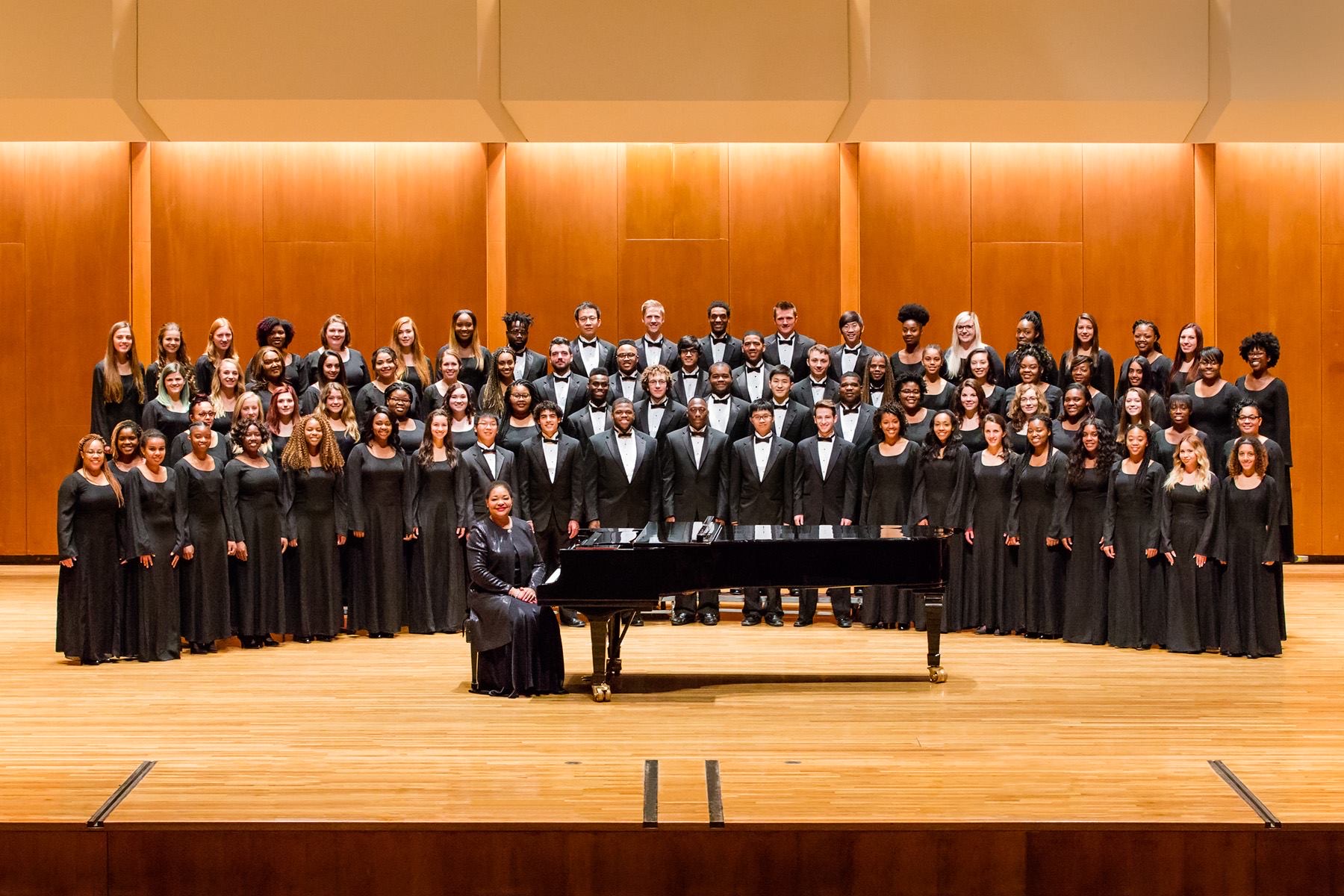On April 15th, the University of Illinois Black Chorus gave its annual Moms Day concert at Krannert Center for the Performing Arts. This concert has been a tradition since the group’s founding in 1968, when four students organized the group to sing and celebrate the music of Black Americans. The group currently operates under the artistic direction of Dr. Ollie Watts Davis (UIUC School of Music) with student officers: President Amy Watson, Vice-President Paula West (who served as the Concert Emcee), Secretary Demia Simon, and Treasurer Téa Patterson.
The concert was a joyful celebration of music by Black American artists, including composer Quandra L. Clark (Assistant Director) and Dr. Ollie Watts Davis (Artistic Director & Conductor) from among the group’s own ranks. Most of the composers and arrangers listed in the program are still with us, a rare occurrence in much concert music. They divided it into three sections: Spirituals, Hymns, & Anthems; Tribute to Popular Music; and Contemporary Gospel.
From the group’s program, they write:
The spirituals, hymns, anthems, popular songs, and gospel songs on this concert represent a continuum of suffering and glory, longing and resolve, tension and release. This music carries the markings of a community looking for and finding escape, freedom, rest, dignity, faith, and hope. This is music to enliven the spirit and soothe the soul. The legacy of performing these melodies is being carried forward with nobility, energy, generosity, and excellence. We are deeply indebted to this faith journey. For the joy that is set before us empowers us to endure!
The concert opened with an arrangement of “Lord, How Come Me Here?” by Evelyn Simpson-Cureton (b.1953), featuring Lauren Harper (soprano) and Abby Grace (flute). This arrangement walks the difficult line of blending tradition and innovation with grace — a theme that easily extends to the entire evening. Harper’s well-practiced soprano is clear and effortless, operatic in her control and facility while never sacrificing emotion for technical execution. Her high register, in particular, speaks to so many hours of practiced rehearsal. Grace’s flute accompaniment looks toward contemporary techniques — including but not limited to influences from jazz — that take already-expressive music to new heights.
The remaining spirituals, hymns, and anthems featured the entire chorus, and included Thomas Dorsey’s “Precious Lord” (arranged by Arnold Sevier), “Great is Thy Faithfulness” (arranged by K. Edward Copeland), and “Lift Every Voice and Sing,” a setting of James Weldon Johnson’s famous poem of the same name, with music by Roland Carter. The “continuum of emotion” that the group describes in its program is on full display, but joy is probably the most prominent. Some of it is in the music; much of it comes from the musicians themselves and how much they have clearly invested in this. In a world that so often refuses to acknowledge or accept Black joy, this kind of celebratory music-making needs to be heard.

The selections from the group’s second installment, Tribute to Popular Music, were chosen from “Mom’s Favorite Music” and dedicated to the moms in the audience for Moms Weekend. This portion was a fun and creative take on celebrating black artists. The singers performing this portion did not perform under their own names, nor were they credited with solos. Instead, they were announced and came onstage as their respective artists. “Stevie Wonder,” complete with sunglasses, was assisted onstage; “Barry White” arrived with smooth, genuine swagger. The beauty of evoking famous Black artists wasn’t that the singers were cosplaying them. They performed under their names and included just enough mannerisms to evoke the spirit of each of their artists. They didn’t fade into the background and become Phyllis Hyman, Barry White, The Pointer Sisters, Stevie Wonder, and the Ramsey Lewis Trio, but made their respective influences and inspirations clear. I could easily imagine the kind of conversations about music and style that would have taken place if these students had met these artists in person; in some ways, through preparing this performance, they have.
After a brief pause, the final segment of the concert began. The audience was particularly moved by the choir’s rendition of Braxton D. Shelley’s “Due Glory,” featuring Jasmine Henderson as the soprano soloist, and with good reason. Henderson has a voice that fills the house, and that can almost literally lift you out of your chair. I couldn’t help but feel, as I was hearing her sing so well and with such passion, how lucky her future students are to have a teacher who has sung with a group like this. It’s clearly no accident that a contingent of Black Chorus’ members are studying for degrees in Education (including Henderson) and in Community Engagement.
Following the end blessing before their final number, the students were thrilled to announce that Dr. Davis had been named the Suzanne and William Allen Distinguished Professor in Music. Such announcements of positions like these in academia are often met with tempered applause. The students and audience erupted — a testament to the commitment and success of Dr. Davis’ leadership. She has done so much to maintain and direct this musical community, and her community knows what they have in her.
The most wonderful thing about a concert like this was to see and hear the pride that these young artists have in this music, and how well they own it. They are so far beyond knowing their music or being well-rehearsed; this music really belongs to them, as artists. The joy that they have in making it, the inspiration that they take from their director and from the artists whose music they perform, and their commitment to excellence in singing make their music exhilarating to listen to.








